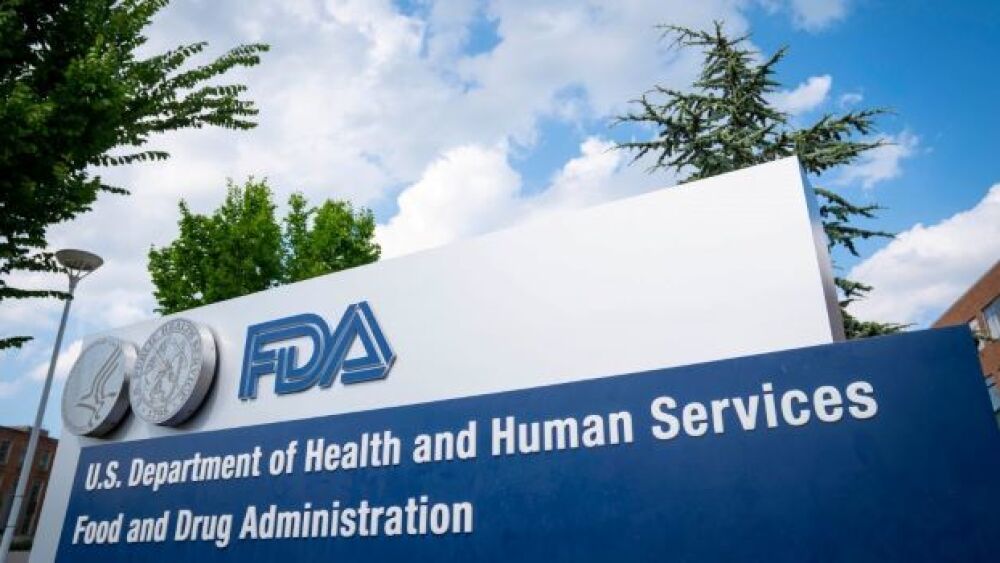Daiichi-Sankyo and AstraZeneca’s sBLA for HER2 directed Enhertu accepted by FDA. Novartis gets BLA acceptance for MS biosimilar. HOOKIPA’s IND for prostate cancer immunotherapy candidate accepted
Sarah Silbiger/Getty Images
On Monday, the high-profile partnership between Japan’s Daiichi-Sankyo and British-Swedish multinational AstraZeneca announced that the United States Food and Drug Administration has accepted their supplemental Biologics License Application (sBLA) for Enhertu (trastuzumab deruxtecan), their HER2-directed candidate for unresectable or metastatic breast cancer.
If approved, Enhertu could address an unmet therapeutic need in patients with metastatic breast cancer who have lower HER2 expression levels. The sBLA has been granted Priority Review by the FDA, further pointing to the candidate’s potential to improve outcomes in this patient population. The FDA is expected to come out with a regulatory decision later this year.
Data from the Phase III DESTINY-Breast04 trial formed the core of Enhertu’s sBLA. The trial enrolled over 550 patients with low HER2 levels. Compared with physician-chosen chemotherapy, treatment with Enhertu led to significantly longer progression-free and overall survival. The drug candidate also proved to be as safe and tolerable as existing chemotherapies.
“For more than two decades, only patients with HER2-positive breast cancer have been able to benefit from HER2-targeted therapies. If approved, Enhertu will redefine how we classify and treat metastatic breast cancer, enabling patients whose tumours have lower levels of HER2 expression the opportunity to benefit from a HER2-directed therapy,” Susan Galbraith, executive vice president of oncology R&D at AstraZeneca, said in a statement.
Breast cancer is the most common type of cancer. In about 20% of cases, tumor cells harbor an extra copy of the HER2 gene, leading to an overabundance of the protein. These HER2-positive breast cancers tend to be more aggressive than others. While current treatment options that specifically target HER2 are effective, they often yield disappointing efficacies in patients with low levels of HER2.
Designed using Daiichi Sankyo’s proprietary platform, Enhertu seeks to improve treatment outcomes in these so-called “HER2-low” patients by combining a HER2-directed monoclonal antibody with a topoisomerase I inhibitor payload, using a tetrapeptide-based linker to stabilize the entire system.
First-of-a-kind MS Biosimilar Also Earns BLA
Also reporting a regulatory win is Sandoz, a Novartis company. The Basel, Switzerland-based biopharma firm revealed that the FDA has also accepted the BLA for its biosimilar natalizumab.
The biosimilar is developed by Polpharma Biologics, which used Biogen’s Tysabri as a reference, emulating its intravenous dosing regimen, route of administration and presentation. Sandoz’s BLA also covers all of Tysabri’s indications, including those for relapsing types of multiple sclerosis (MS) such as clinically isolated syndrome, relapsing-remitting MS, Crohn’s disease and active secondary progressive disease in adults.
The BLA was based on data from the Phase I and III Antelope studies, which showed that Polpharma’s biosimilar performed similarly to the reference drug in terms of efficacy, safety and immunogenicity.
“Thanks to advances in medicine over the last 20 years, we now have DMTs [disease-modifying therapies], which have become a cornerstone in the treatment of MS. However, access to affordable, high-quality treatment options is still a challenge,” Florian Bieber, global head of biopharmaceuticals development at Sandoz, said in a statement.
This BLA application hopes to address that gap not only by making such an impactful drug accessible to a greater number of patients, but also by providing healthcare systems a more economical option, which could lead to significant savings.
FDA Accepts HOOKIPA’s IND Application for Prostate Cancer
Joining these industry giants is the relatively smaller HOOKIPA Pharma, which also announced today that the FDA has accepted its Investigational New Drug application for HB-300, the company’s immunotherapy candidate for metastatic, castration-resistant prostate cancer.
At early stages, prostate cancer can still be treated by suppressing testosterone levels. But when it progresses and becomes castration-resistant, hormone therapies become ineffective. HB-300 seeks to address advanced prostate cancer by using two viral vectors—the lymphocytic choriomeningitis virus and the pichinde virus—that express the PAP and PSA antigens associated with prostate cancer.
Preclinical studies have shown that this approach can induce antigen-specific T cell responses that lead to strong anti-tumor activity. If its IND is approved, HOOKIPA will test if HB-300’s promising laboratory performance holds up in the clinic.
“FDA acceptance of our IND application for HB-300 is a key milestone as we expand and diversify our oncology pipeline and arenavirus platform from viral antigens to self-antigens,” Joern Aldag, chief executive officer at HOOKIPA, said in a statement.






